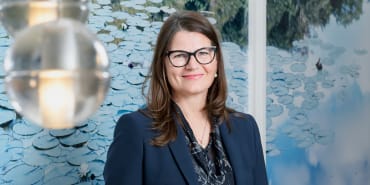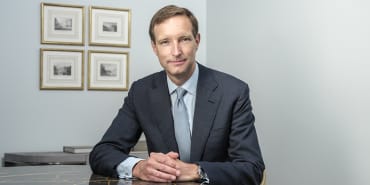Published in Private on 29 April 2025
“The coming years will witness the greatest transfer of wealth in the history of humanity. Optimum management of this transfer will be crucial, to avoid dispersing family wealth and to maintain Italy’s competitiveness.” This is how Alberica Brivio Sforza, managing director of Lombard Odier in Italy, who has substantial experience in managing the wealth of high net worth clients, sees the situation. A graduate of Bocconi University, she was previously head of J.P. Morgan Private Banking Italia and, prior to that, held leading roles at BNP Paribas, as well as at a number of private equity and hedge funds.
Changes are under way
“Baby boomers, who comprise the most numerous generation in the West, are getting near the point of passing the torch. The beneficiaries of this development are people aged between 40 and 60, with mindsets, objectives and expectations that are very different from those of the previous generation,” says Brivio Sforza.
Significant shares of wealth will pass into female hands, and women often have an approach to saving and investments that differs from men’s: less orientated towards risk-taking and more towards the long term
This brings to light another new aspect, related to the fact that significant shares of wealth will pass into female hands, “and women often have an approach to saving and investments that differs from men’s: less orientated towards risk-taking and more towards the long term.” Women and the younger generations are also more sensitive to values-related decisions in the investment sphere. “There is a steadily increasing tendency to invest not just to protect and enhance the real value of the portfolio, but also to have a positive impact on today’s society and above all on future generations,” the head of Lombard Odier Italy emphasises. This is thinking that shows how, notwithstanding pressures from America, the issue of sustainability remains crucial in Europe.
Read also: Women investors: how should your investment portfolio adapt to life’s milestones and goals?
“Building” philanthropy
The theme of values calls to mind the field of philanthropy, which in Italy continues to be much smaller in scale compared to other markets. “We don’t have a widespread culture in this respect.” Italy has an inheritance tax system almost like that of a tax haven, and this could partly explain the lack of conviction that “the wealth created during life can be distributed more broadly.” Nonetheless, according to Brivio Sforza, the increasing role of women in family wealth management could drive the growth of philanthropy.
At Lombard Odier we invest significant amounts to recruit specialists and scientists to find the companies that will have a future in the new era and the ones that will fall behind
Research that makes the difference
“ESG issues are crucial in the financial field, not just as an ethical imperative but also because they have decisive influence on business operations and risk-taking,” the expert continues. “At Lombard Odier we invest significant amounts to recruit specialists and scientists who investigate the nature of sustainability in terms of investment, and find the companies that will have a future in the new era and the ones that will fall behind. We have around 70 experts dedicated to sustainability who, together with the investment team, are responsible for identifying the best investment opportunities in this area for our clients.”
Read also: “We are not entering an era of change, but a change of era” – interview with Marc Palahí, our Chief Nature Officer
The group, she continues, also includes a wealth planner who isn’t a banker, but rather a professional with a background in taxation, to help clients understand how best to pass on their wealth. “They support other professionals, taking on an increasingly important role in families where parents and children are often separated by significant geographical distances, or when the matter concerns the management of companies operating in highly diverse regulatory contexts.”
ESG issues are crucial, not just as an ethical imperative, but also because they have decisive influence on business operations and risk-taking
The loyalty card
A number of international studies have shown that when inheritance passes to the younger generation, they tend to change their private bank. “This is true, and that’s what drives us to maintain constant intergenerational dialogue within client families,” Brivio Sforza emphasises. “Our work continues to centre on relationships but, more and more, we focus on services and channels that are in line with the needs of younger generations. In turn, we also rely on younger professionals to promote dialogue with the new beneficiaries of wealth.”
Read also: From geopolitics to AI – entrepreneurs and family businesses rethink a changing world at LO Generations 2024
Finally, a reflection on the future ahead of us. Recently, the Economist dedicated its cover story to the “Inheritocracy”, referring to the fact that more and more new wealth is not coming from entrepreneurs, but from people who have inherited the fortunes of their parents or grandparents. “Such a situation can put social equilibrium at risk and lead to the loss of intellectual capital, especially in a country like ours, which has always built its fortunes on widespread entrepreneurship,” Brivio Sforza observes. This calls for systemic reflection on the subject, to avoid conflicts that are difficult to manage.
Our work continues to centre on relationships but, more and more, we focus on services and channels that are in line with the needs of younger generations
The market view
“After two exceptional years, GDP growth in the US could slow in 2025, as businesses are postponing capital investment decisions due to an unpredictable tariff policy,” says a recent report by Luca Bindelli and Filippo Pallotti, respectively Head of Investment Strategy and Macro Strategist at Bank Lombard Odier & Co. Ltd. “Consumer spending, which represents almost 70% of GDP in the US, remains solid, despite the risk of increased inflation due to higher import costs,” the authors of the study explain.
In the upcoming quarters, Lombard Odier estimates that "the tariffs will slow US GDP growth to 1.8% in 2025, with average inflation of 2.7%". Moreover, "net exports and public spending will have a slight dampening effect on GDP, while delayed investment decisions could recover in the second half of the year, as uncertainty diminishes and political incentives emerge".







share.